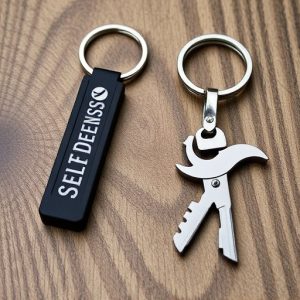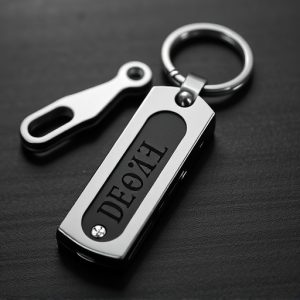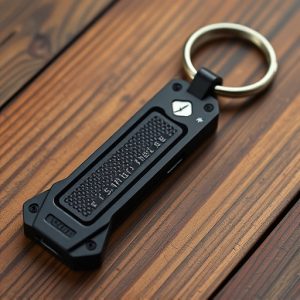Tactical Keychain Laws: Navigating Self-Defense Tool Legalities
Understanding state laws regarding tactical keychain self-defense tools is crucial for responsible p…….
Understanding state laws regarding tactical keychain self-defense tools is crucial for responsible personal safety. Each U.S. state has unique rules about possession and use, covering mechanisms, age limits, and public safety. Researching local concealed carry laws, device restrictions, and legislative changes is vital to stay within legal limits while prioritizing safety. Adhering to these guidelines ensures lawful self-defense use of tools like pepper spray, knives, or stun guns, balancing personal security with public concerns.
“In today’s uncertain times, understanding self-defense options is crucial for personal safety. For a convenient and readily available tool, tactical keychains have gained popularity as self-defense mechanisms. However, their legality varies state by state, creating a complex landscape for concerned citizens. This article guides you through the legal requirements surrounding tactical keychains as self-defense tools, highlighting critical considerations to ensure your rights and responsibilities are understood. From state regulations to effective defense strategies, discover how to stay protected while adhering to the law.”
- Understanding State Laws Regulating Self-Defense Keychains
- Legal Considerations for Tactical Keychain Carrying
- Permitted Self-Defense Tools and Their Legal Status
- Rights vs. Responsibilities: What You Need to Know
- Effective Defense Strategies: Ensuring Legal Compliance
Understanding State Laws Regulating Self-Defense Keychains
Understanding State Laws Regulating Self-Defense Keychains
In today’s digital era, tactical keychain self-defense tools have emerged as popular personal safety solutions. However, it’s crucial to be aware that their legality varies significantly across states. Each state has its own set of laws and regulations governing the use and possession of self-defense devices, including keychains designed for protection. The legal requirements often involve factors such as permitted defense mechanisms, age restrictions, and public safety considerations.
Before carrying a tactical keychain for self-defense, it’s essential to research and understand your state’s specific rules. Some states allow the use of keychains equipped with certain types of pepper spray or stun features, while others may restrict these devices to law enforcement only. Staying informed about these legal nuances helps ensure compliance and promotes responsible self-defense practices.
Legal Considerations for Tactical Keychain Carrying
When considering a tactical keychain for self-defense, understanding the legal landscape is paramount. Laws surrounding the carrying of such tools vary greatly by state and even county. What may be permissible in one jurisdiction could be strictly regulated or outright banned in another. Key factors include local concealed carry laws, restrictions on the type and size of protective devices allowed, and any specific regulations for tactical keychains.
It’s crucial to research and comply with all relevant statutes and ordinances. This involves checking with your local law enforcement agencies, reviewing state-specific guidelines, and staying informed about recent legislative changes. Carrying a tactical keychain for self-defense should never put you at odds with the law—it’s essential to approach this decision as an informed citizen who prioritizes both personal safety and legal responsibility.
Permitted Self-Defense Tools and Their Legal Status
In many jurisdictions, the legal status of self-defense tools is carefully regulated to balance personal safety with public safety concerns. When it comes to tactical keychain self-defense tools, understanding what is permitted and what falls outside the legal framework is crucial. These tiny yet powerful devices are designed to provide individuals with a means of protection in various situations, from everyday threats to more severe assaults. However, their use is subject to specific laws and regulations that vary by state or region.
Tactical keychains often feature tools like pepper spray, pocket knives, or stun guns, each classified differently under the law. Pepper spray, for instance, is typically legal when used for self-defense but may have restrictions on capacity and carrying locations. Pocket knives can be a more complex issue; while some states permit them as self-defense tools, others have strict guidelines regarding blade length and lock mechanisms. Stun guns or tasers are generally considered legal in many places but often require special permits or licenses. It’s essential for individuals considering tactical keychain self-defense tools to familiarize themselves with their state’s specific laws to ensure they remain within the confines of the law while protecting themselves.
Rights vs. Responsibilities: What You Need to Know
When it comes to carrying tactical keychain self-defense tools, understanding your rights and responsibilities is paramount. While many states allow individuals to possess small self-defense devices like keychains for personal safety, there are strict legal requirements that vary from place to place. These rules dictate how and when you can use these tools, emphasizing the importance of knowing your local laws.
Carrying tactical keychains as a means of self-defense comes with both advantages and constraints. You have the right to protect yourself, but it’s crucial to understand that this right is balanced with responsibilities. Responsibilities include ensuring these devices are legal in your state, keeping them secured, and only using them when necessary for self-defense, adhering to local regulations, and being prepared to face potential consequences if laws are violated.
Effective Defense Strategies: Ensuring Legal Compliance
When considering tactical keychain self-defense tools, understanding effective defense strategies and ensuring legal compliance are paramount. These compact devices can offer a sense of security when facing potential threats, but their use is subject to specific legal requirements that vary by state. One crucial aspect to consider is the definition of “self-defense” under local laws. What constitutes reasonable force in a given situation can differ widely, and misstepping could lead to legal repercussions.
To stay within legal boundaries, familiarize yourself with your state’s self-defense laws. This includes knowing when and how you can use tactical keychain tools for protection without crossing into areas considered excessive or unlawful. Additionally, some states have specific regulations regarding the type of force allowed and the circumstances under which it is justified. Staying informed about these legal nuances empowers you to employ tactical keychain self-defense tools effectively while minimizing potential risks.
When it comes to carrying tactical keychains for self-defense, understanding your state’s legal requirements is paramount. This article has navigated the intricate web of regulations governing these tools, highlighting the importance of knowledge in ensuring your rights and responsibilities are clearly defined. Remember, while self-defense is a vital right, it must be exercised within legal boundaries. Stay informed about local laws, and choose defensive tools that align with permitted options to maintain legal compliance when protecting yourself or others. Tactical keychains can be effective self-defense tools, but their legality hinges on your state’s specific regulations.


